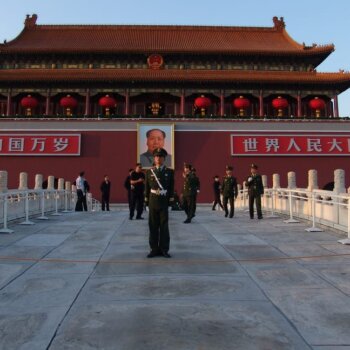AI platform Globality is giving small and medium businesses access to broader opportunities.
Ina post-Brexit, “America First” world, protectionism seems to be back in fashion, and globalization has become something of a dirty word. Since the 1990s, global trade has helped lift over a billion people out of poverty, driven sustained economic growth, lowered consumer prices, and delivered unprecedented freedoms to much of the world’s population.
Still, middle-income earners have seen their living standards stagnate, while many of the great leaps forward in automation are destroying the jobs of those least able to cope, with vastly greater levels of disruption feared.
Large multinational companies still seem to be the greatest beneficiaries of a globalized marketplace. Small and medium-sized businesses, which constitute the bulk of the world’s economy and drive most job creation, find it more difficult to make valuable connections that can lead to international trade opportunities and contracts with large organizations.
This is due in large part to the outdated procurement process based on Requests for Proposals (RFPs), which is still the standard across most industries. RFPs are not only extremely time consuming, but such competitions are used as cover for a procurement decision that has already been made, so prospective smaller suppliers never really stand a chance.
Joel Hyatt cofounded Globality to prove that technology could be the missing link to make globalization work for more businesses. By providing a matchmaking platform that connects big clients–Fortune 500 companies spanning financial services, pharmaceuticals, food and beverage, consumer goods, and other sectors–with a diverse pool of providers, he wants to help those small and medium-sized companies land contracts that would otherwise be out of their reach.
He served as the national finance chair for the Democratic Party during Al Gore’s presidential campaign in 2000, and after the election, partnered with Gore to start a media company that they sold in 2013. When Hyatt started Globality in 2015, Gore became an investor. The company has since raised $35 million in their latest funding round and embarked on a major expansion of its platform that uses artificial intelligence to match the small clients with big contracts all over the world. So far, over a dozen fortune 500 companies and over 40 multinational corporations have signed up on the client side, and its SME (Small and Medium Sized Enterprise) Service Provider Network covers every continent and more than 100 countries.
The platform is made up of three main elements, explains Globality CTO Ran Harpaz: The first gathers information from the client, helping them to determine what their real needs are. The second matches them with the best service provider to fulfill those needs, and the third helps build the relationship by fostering collaboration between the two parties.
For the first part, the client answers a detailed Q&A devised by their experts. Their algorithms then extract a variety of data points from those clients using NLP (Natural Language Processing) and continues to build upon that in a constant learning loop. It takes all the information from the questions it asks of both client and providers during the matching process to suggest a shortlist of possible matches, which is then reviewed by an industry expert consultant at the final stages.
This AI-powered consultancy model effectively harnesses the best of both worlds, according to Harpaz, as it scales the nuanced, sector-specific expertise that traditionally comes at a prohibitive premium. By leveraging machine learning to recognize interactions–often spotting patterns in the data that might not have occurred to a person and using that in the matching process–this high-level human know-how becomes accessible to companies without multimillion-dollar consultancy budgets at their disposal.
“At every step, the system is collating feedback from both sides, learning from signals that tell it how the match is actually working in practice by prompting them with questions based on interaction data,” Harpaz says. “This systematic approach to human knowledge representation effectively gives people superpowers, by taking that magic sauce of human interaction and knowledge, and making it possible to apply that consistently and at scale.”
Although this process is building toward ever more efficient automation, Harpaz says that they will always need a human expert to look at those matches with a strategic eye and make the final decision on the most suitable pairings. “What Globality is doing is making high-level knowledge and expertise accessible to a much larger pool of companies and people, rather than only the large corporations who have been traditionally able to afford the services of consultancy firms,” he explains. Globality’s pricing model is usually free for client companies, with suppliers being charged a percentage of the contract’s value, but only once they receive payment themselves for the services they provided.
Waqqas Mir, a partner at Axis Law Chambers, a law firm based in Lahore, Pakistan, is one of the suppliers using Globality to reach international clients. Mir feels that law firms such as his in developing countries often lose out on such business because of their size. Being on the platform, however, gives them the opportunity to open up new channels of communication, which he believes provides great value in the long term. “That allows you to begin a relationship and remain on their radar,” he explains. “The whole thing is motivated by a desire to ensure a more inclusive global economy.”
Globality matched a Fortune 50 company with South African marketing agency Colourworks. The company had to find service providers who were Broad-Based Black Economic Empowerment-certified by the South African government. “So we worked backwards from that, looking at all the providers who matched the certification criteria, and narrowing it down from there,” Harpaz says.
Since winning the Africa account, the agency has continued to use the Globality platform to connect with their new client on a global level, and are now exploring the possibility of working with them in Germany. “In this day and age, it is so easy to do business online or over video conferencing, so distance is really not a barrier,” says Lexy Geyer, account director at Colourworks.
Enabling smaller companies to become “micro-multinationals” means they will in turn fuel job creation and economic growth throughout the developed and developing world. Globalization and AI are often portrayed as inevitable waves of disruption that will leave chaos and inequality in their wake and ultimately make much of humankind and their skills redundant. But if platforms like Globality continue to create opportunities for diverse smaller businesss in this global marketplace, perhaps globalization can become a force for good.
_________________________________________________________
About the Author
This article was produced by Alice Bonasio.





























